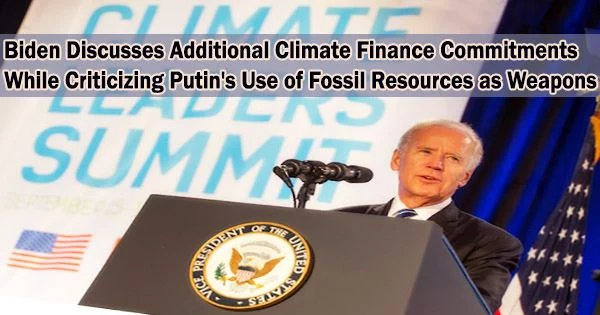In his keynote address at the UN’s COP27 climate summit on Friday (November 11, 2022), U.S. President Joe Biden took aim at Russian President Vladimir Putin, warning that Moscow’s conflict in Ukraine cannot derail efforts to battle climate change.
The volatility of the energy market and the inflationary pressures brought on by the Kremlin’s invasion, according to Biden, who was speaking in Sharm El-Sheikh, Egypt, underscore the necessity for nations to move away from fossil fuels. He also added that no nation could “use energy as a weapon and hold the global economy hostage.”
“It’s more urgent than ever that we double down on our climate commitments. Russia’s war only enhances the urgency of the need to transition the world off this dependency on fossil fuels,” Biden said, reiterating similar comments by world leaders earlier in the week.
The president also announced a number of financial packages to aid developing countries in his speech, outlining how the U.S. intends to respond to the climate catastrophe with “urgency and determination.”
Those measures include a $500 million fund formed in collaboration with the European Union and Germany to facilitate Egypt’s transition to clean energy, and more than $150 million in initiatives that aid “preparedness and adaptation efforts” across Africa.
“Today, as a down payment, we’re announcing more than $150 million in initiatives that specifically support preparedness and adaptation efforts in Africa,” Biden said. Such initiatives include broadening access to climate finance, providing disaster risk protection, strengthening food security and mobilizing the private sector, he added.
Biden also reaffirmed the U.S.’s commitment to meet its target of cutting emissions 50-52% below 2005 levels by 2030: “The United States will meet our emissions targets by 2030,” he said.
Reparations take center stage at COP27
A broader promise to compensation for nations most impacted by climate change was absent from the announcement, though.
Reparations, or “loss and damage” funding, is a highly contentious issue that has taken center stage at the COP27 summit this year.
After 48 hours of negotiations led by Pakistan, the contentious subject was officially added to the agenda for the first time on Sunday at the start of the COP27 climate meeting.
Pakistan’s foreign minister told CNBC Tuesday that catastrophic floods that submerged one-third of the country earlier this year reiterated the need for wealthy countries to deliver on reparations.
“This is not going to stop at Pakistan,” he warned, pointing to the uptick in climate disasters anticipated as a result of global warming. “The next country that’s affected should have something available so that they can address the loss and damage.”
A flurry of major U.N. reports published in recent weeks delivered a bleak assessment of how close the planet is to irreversible climate breakdown, warning there is “no credible pathway” in place to cap global heating at the critical temperature threshold of 1.5 degrees Celsius.
Securing commitment from wealthy nations
Still, just how far commitment to such reparations will go remains unclear.
So yet, just a limited number of European nations have pledged money, including Belgium, Denmark, Germany, and Scotland. The low amount, however, falls well short of the hundreds of billions of dollars that experts estimate will be required annually by 2030 to assist communities in rebuilding after disasters.
Wealthy countries have long opposed the establishment of a fund to deal with loss and damage, and many governments worry that taking responsibility may lead to a flood of legal action from states fighting the climate disaster on the front lines.
U.S. climate envoy John Kerry has previously indicated the U.S. would not be prepared to compensate countries for the loss and damage they’ve suffered as a result of the climate emergency. But on Wednesday he appeared to step back those comments, saying Washington would not be “obstructing” talks on loss and damage.
He also proposed that developing countries could raise finance to transition their economies to clean energy by selling carbon offsets to U.S. companies.
Carbon offsetting is the process of removing or reducing greenhouse gases, such as through the preservation of forests, the development of renewable energy sources, or other climate-friendly initiatives, in order to make up for emissions produced elsewhere.
The idea was revived this year at COP27, but detractors continue to claim that it can encourage green washing and allow businesses to put off their own decarbonization initiatives.
















